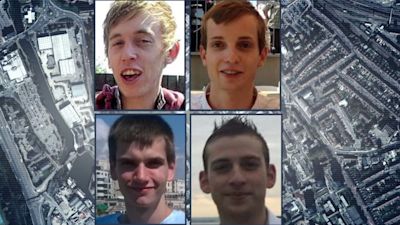Who were Stephen Port's victims and why did it take police 15 months to catch him?

The inquests into the victims of serial killer Stephen Port has opened, years after he was found guilty of the murders of Jack Taylor, Daniel Whitworth, Gabriel Kovari and Anthony Walgate.
The inquests come six years after Port’s 16-month killing spree was brought to an end, following the death of the final victim, Mr Taylor.
The chef stalked his victims on gay dating apps including Grindr and plied them with fatal amounts of date-rape drugs so he could attack them.
As the inquests open, who were Stephen Port's victims and why was he able to dupe the police for over a year?
What was Stephen Port convicted of?
An Old Bailey jury convicted Port of a total of 22 offences against 11 men, including the four murders, four rapes, 10 counts of administering a substance, and four sex assaults in November 2016. He was cleared on three counts of rape.Port was found guilty of murdering four young men after duping police for over a year as he committed his killing spree.
He secretly drugged his victims, whom he found through dating apps, to indulge in a fetish for sex with unconscious men and then dumped their bodies yards from his flat.
Who were his victims?
Anthony Walgate
Mr Walgate, a 23-year-old fashion and design student at Middlesex University and part-time male escort, was Port's first victim in June 2014.
Port offered him £800 for an overnight date, an offer Mr Walgate was so cautious of he gave his friend Ellie Green the details "in case I get killed".
He was found dead outside the communal entrance to Port's block of flats in the early hours of June 19, 2014. Port made the 999 call pretending he had come across the body while out driving.
Mr Walgate's body was found with 14 separate injuries which included grazes and bruising to his inside upper left arm.
Officers later realised Port had hired Mr Walgate as an escort and had been lying about the events of that night.
Port was prosecuted for perverting the cause of justice over the lies he had told police and jailed in March 2015, but by that time he had already killed his next two victims Gabriel Kovari and Daniel Whitworth.
Gabriel Kovari
Gabriel Kovari, 22, from Slovakia moved into Port's Barking flat in August 2014 after he agreed to put him up on the sofa rent-free.
Port was on bail at the time on the charge of perverting the course of justice.
Within days, Mr Kovari said he wanted to move out.
On August 27, Port told his sister Sharon on the phone that there was a dead body in the bed at his flat and she advised him to go to the police.
But the following day, Mr Kovari's body was found dumped 500 metres away in Barking Abbey graveyard by a dog walker. He was propped up wearing sunglasses next to a bag of his belongings.
Daniel Whitworth
Daniel Whitworth, 21, met Port through a dating website in August 2014 - before the death of Mr Kovari - but they did not meet up until the evening of Thursday, September 18, 2014.
He was reported missing when he failed to turn up for work the next day. Meanwhile, Port deleted his Fitlads account.
On September 20, his body was found by the same dog walker in the same spot as Mr Kovari.
His mobile was missing and a fake suicide note was in his hand implicating him in the death of the young Slovakian the month before - a note the police took at face value. It was written by Port as part of his elaborate cover-up.
Jack Taylor
The killings stopped while Port served his sentence for lying about Mr Walgate's death. He had been sentenced to eight months, served half and was then freed on licence.
After his release, Port killed his fourth and final victim, Jack Taylor, a 25-year-old forklift driver from Dagenham, Essex. CCTV captured him walking with Port in the final sighting before he was murdered.
Why did it take a year a half to link Port to the murders?
It took the Metropolitan Police some 15 months to link the men's deaths and catch their killer.
The sisters of Port's final victim, Jack Taylor, believe he should have been caught earlier.
Donna Taylor told ITV News, "Had (the Metropolitan police) done their jobs properly Jack would still be here.”
At the time, Mr Taylor's sisters refused to accept the police's explanation of how their brother died. Officers told them he had died from a self-induced drugs overdose.
They felt something was not right and began their own investigation trying to piece together the last hours of his life based on their suspicions. But the police remained unconvinced.
"It felt like we were doing the police job, that's how it felt," Jenny Taylor said.
Sister Donna Taylor said: "We were up till five, half five every morning, started off with one sheet of A4 and ended up with probably about 100 ... of just different bits we'd found but we weren't sure where they went ... if they definitely connected."
"Stephen Port may have done what he's done to Jack but if (the police) had done their job properly Jack would still be here,” said Donna Taylor.
“I will take that with me for the rest of my life, we all will.
A senior Metropolitan Police officer offered an apology to the victims’ families and highlighted changes the force had made since the Port case.
They include a written protocol for minimum standards of investigation for unexplained deaths and extra training for officers on how drugs can be used as a weapon by offenders to facilitate rape and sexual assault, as well as on issues that impact on the confidence of our LGBT+ communities."